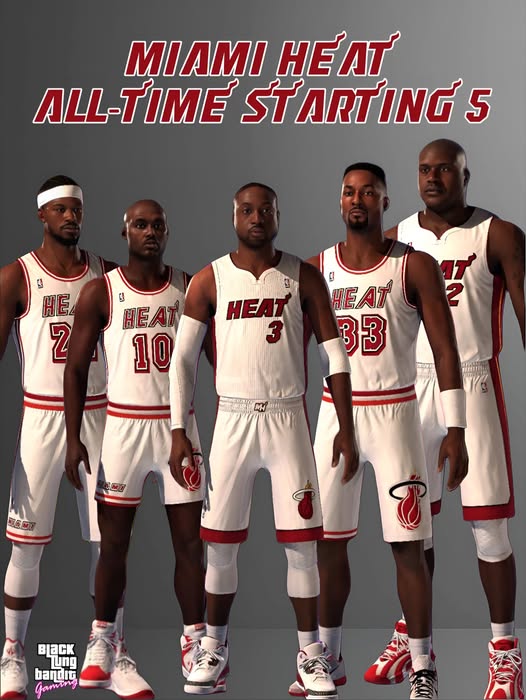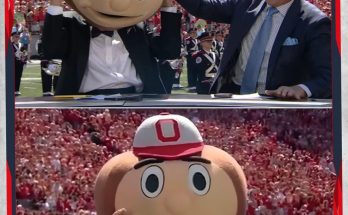The Miami Heat, one of the NBA’s most respected franchises, are the embodiment of grit, intensity, and excellence. Since their inception in 1988, the Heat have forged a unique identity built on relentless defense, disciplined execution, and an unapologetic hunger to win. Through eras of growth, dominance, and rebirth, Miami’s culture has been crystallized by the players who wore its colors with pride and purpose. Choosing an all-time starting five for the Miami Heat isn’t just a celebration of talent—it’s a tribute to the enduring essence of Heat Culture. From ruthless scorers to intimidating rim protectors, from fiery leaders to unsung heroes who rose in defining moments, this lineup captures the heart of everything the Heat represent.
At point guard, the choice begins with an acknowledgment of what the position means to Miami’s system. The Heat have historically relied more on strong team play than star-studded point guard performances, but one player elevated the position with command, clutch instincts, and championship poise—Tim Hardaway. Acquired from Golden State in the mid-90s, Hardaway brought swagger, speed, and a deadly crossover to South Beach. He quickly became the floor general of Pat Riley’s grind-it-out squads, forming a dynamic duo with Alonzo Mourning that propelled Miami to its first sustained stretch of success. Hardaway was not just a flashy dribbler; he was a brilliant orchestrator and fierce competitor who took pride in defense and often came through in pressure situations. In his six seasons with the Heat, he earned All-NBA honors, delivered multiple 20-point, 10-assist campaigns, and helped shift the Heat from an expansion franchise to an Eastern Conference power. Though his teams ran into the Jordan-led Bulls and the Knicks’ wars of attrition, Hardaway set a standard for toughness and leadership that fits the point guard slot in Miami’s all-time five.
Shooting guard is perhaps the easiest and most undeniable selection—not just in the history of the franchise, but in the lineage of NBA greatness. Dwyane Wade is the Heat. Drafted fifth overall in 2003, Wade didn’t take long to announce his arrival as a game-changer. He led the team to the playoffs as a rookie, then followed that up with one of the most iconic Finals performances in NBA history in 2006, willing the Heat from a 0-2 deficit against the Dallas Mavericks to win the franchise’s first championship. His averages in that series—34.7 points, 7.8 rebounds, and 3.8 assists—were matched only by the legends of the game, and he did it with poise, flair, and ferocity that belied his years. But Wade’s legacy extends far beyond one magical run. He would go on to be the cornerstone of the Big Three era, recruiting LeBron James and Chris Bosh to Miami, putting ego aside for the greater good, and guiding the team to four consecutive Finals appearances and back-to-back championships in 2012 and 2013. A 13-time All-Star and the all-time leader in virtually every meaningful category for the franchise—points, assists, steals, games played—Wade’s combination of slashing brilliance, clutch heroics, and unmatched loyalty cements him as the franchise’s spiritual and statistical cornerstone.
At small forward, the conversation begins and ends with LeBron James. His tenure in Miami was short by historical standards—just four seasons—but no player in franchise history had a more dominant peak. From 2010 to 2014, LeBron was operating at the height of his powers, a blend of strength, speed, intelligence, and skill that the league had rarely, if ever, seen. During the 2012-13 season, James averaged 26.8 points, 8.0 rebounds, and 7.3 assists per game while shooting an astounding 56.5% from the field. He led the Heat to a 66-win season and a 27-game winning streak, the second-longest in NBA history. That same year, he captured his fourth MVP award and solidified his place as the most complete basketball player of his generation. But perhaps more impressive than the numbers was the transformation James underwent in Miami. Under Erik Spoelstra and the Heat’s exacting standards, LeBron honed his defensive versatility, refined his post game, and embraced the challenge of greatness with surgical precision. He became a two-time champion in Miami, delivering when the stakes were highest, from the Game 6 block on Tiago Splitter to the clutch dagger in Game 7 of the 2013 Finals. His four-year Miami run produced two titles, two MVPs, and an indelible sense of basketball perfection.
Power forward is a more nuanced position in Heat history, but ultimately, the slot belongs to Chris Bosh. His contributions to Miami’s dynasty are too often understated, but within the Heat organization, his value was never in doubt. When Bosh joined Miami in 2010, he was already a perennial All-Star and statistical force in Toronto. But in Miami, he transformed his game, sacrificing touches and spotlight for the sake of team success. He stretched the floor with his mid-range and later three-point shooting, provided elite help-side defense, and played small-ball center in crucial moments before it became the league’s standard. Bosh was the fulcrum around which Miami’s spacing and defensive rotations turned. He hit perhaps the most underrated shot in NBA history—the offensive rebound and assist to Ray Allen in Game 6 of the 2013 Finals are iconic, but Bosh’s clutch jumper in overtime sealed that game. Time and again, Bosh made the smart play, the hard rotation, the quiet sacrifice. His career was cut short by health issues, but he remains one of the most intelligent and unselfish stars the game has seen. In a lineup that celebrates Heat Culture, Bosh is a no-brainer.
Center is another storied position in Miami lore, and here the answer is Alonzo Mourning. The heartbeat of the late 90s Heat, Mourning brought a fierce, unrelenting tenacity that helped define Miami’s blue-collar identity. A defensive anchor, two-time Defensive Player of the Year, and seven-time All-Star, Mourning was the face of the franchise before Wade’s emergence. His battles with the Knicks were legendary, his shot-blocking instinct was unmatched, and his passion for the game inspired teammates and tormented opponents. Even after a life-threatening kidney illness, Mourning returned to the Heat and played a pivotal role off the bench during the 2006 championship run, providing rim protection and veteran leadership that were invaluable. He was inducted into the Hall of Fame in 2014, a testament not only to his individual brilliance but to the resilience that characterized his career. Mourning’s story is Miami’s story—overcoming adversity, demanding excellence, and standing firm when tested. No other center in Heat history captured the totality of Miami’s values the way Zo did.
Beyond the starting five, the Heat have had remarkable players who, while not cracking the first unit, left indelible marks on the franchise. Glen Rice, the early scoring machine with a sweet jumper; Eddie Jones, a hometown product and two-way star; Udonis Haslem, the ultimate glue guy and culture enforcer; and Jimmy Butler, whose playoff heroics nearly willed the Heat to improbable Finals appearances—each deserves mention. Shaquille O’Neal’s impact was short but meaningful, helping Wade win that first title. Ray Allen’s shot remains immortal. Yet the all-time starting five isn’t just about accolades or numbers. It’s about embodying the full force of Heat Culture. Hardaway was the street-hardened general. Wade, the mythic hero. LeBron, the perfect weapon. Bosh, the noble tactician. Mourning, the iron soul.
Together, they form a lineup that could take on any team, in any era—not just because of talent, but because of belief. Belief in the system. Belief in the grind. Belief that no moment is too big, and no obstacle too great. That belief has propelled Miami to three NBA championships, six Finals appearances, and a lasting place among the league’s elite franchises. Their culture doesn’t depend on geography or celebrity. It thrives in the sweat, in the sacrifice, in the silence before a storm of applause. The Miami Heat All-Time Starting Five isn’t a list—it’s a creed. A standard. A fire that never dies.



